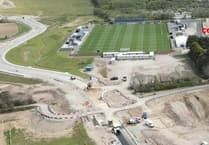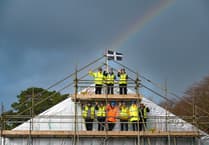A MAN who describes himself as a “working class window cleaner” and not the “rogue trader” he believes he was portrayed as at a Cornwall Council meeting this week has denied the barn he owns was ever an “illegal wedding venue” as described during discussions.
While admitting mistakes were made through ignorance rather than malice, Travis Stevens is disappointed that his bid to convert a redundant barn on his land to an eco-home was refused by the council’s west area planning committee this week.
Mr Stevens had applied to convert the barn, which was originally built without planning permission but later approved for horticultural use, at his property, Trevoole Farmhouse, at Praze-An-Beeble, near Camborne.
The meeting heard objections from Crowan Parish Council that there was no evidence it was ever used for horticulture, but had been a venue for weddings and other social functions. Cornwall councillor Loveday Jenkin, who represents the area, told the committee the barn’s use as a wedding venue was illegal and had been the subject of a number of enforcement actions in the past.
The application was refused on the grounds conversion would represent unsustainable residential development in open countryside.
Following the meeting, Mr Stevens – who said there was never any enforcement action made against him concerning the barn – said: “We are not outraged with the councillors or the council – we appreciate what they do, but feel we have been unfairly treated in this case.”
He added: “I was made out to be a little bit like a rogue trader, but that couldn’t be further from the truth. Mistakes were made but how it was portrayed in the meeting was quite shocking.”
Mr Stevens described himself as a “working class window cleaner” who uses the money from his day job to fund the restoration of the old farmhouse and barns – one of which he lives in – on his smallholding at Trevoole.
He told us that he and his ex-wife did erect the barn illegally “more through ignorance than anything” to support open garden days they held for charity.
“We did obtain a wedding licence in order to have two close friends marry at the farm, which was done before the building was even built. The allegation we had a wedding business is just not true – we held wedding receptions for friends but it was never a business. It was definitely not the case that we flouted the law,” said Mr Stevens.
“We did try to obtain a wedding licence for a wedding business but were told the building wasn’t suitable with not good access, so that idea was shelved. When my marriage broke down the building was not used for a while. In the meantime I sought retrospective planning for the building to be used as a horticultural barn, which I was very grateful to the council to be granted.”
Mr Stevens said the building has been used for growing produce and agricultural storage since then, despite comments made at the meeting that the barn didn’t have a horticultural use.
“With the garden still developing around the building, my new wife and I decided to go for planning permission to have a residential property, hence the planning hearing. While we are very much in favour of checks and balances, and local councillors being able to oversee development, we feel in this case they have had some wrong facts about the building.
“Their objections, such as it being built on its own in the countryside, are not founded as only a few metres away in a field above there have been two houses built with similar access. We were hoping to build an eco-friendly property that at some point I could move into as a home with my wife and dogs. None of the neighbours are at all bothered.”
Mr Stevens said he was discussing with a planning consultant whether to appeal the decision.


.png?width=209&height=140&crop=209:145,smart&quality=75)


Comments
This article has no comments yet. Be the first to leave a comment.